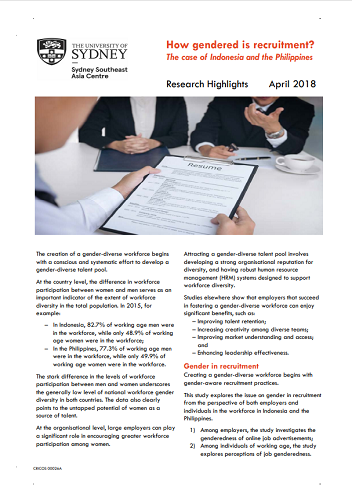How gendered is recruitment? The case of Indonesia and the Philippines
Summary
This factsheet explores gendered recruitment practices in Indonesia and the Philippines, highlighting cultural influences and perceptions in job advertisements.
Workplace participation levels serve as an important indicator of workforce diversity in the total population, however in 2015 there was a stark difference in the levels of workforce participation between men and women in both countries. In Indonesia 83% of men were in the workforce compared to just 49% of women, and in the Philippines 77% of men were in the workforce, compared to just 50% of women.
The factsheet also highlights the important role that human resource management plays in overcoming this imbalance and supporting workforce diversity. In particular, gender-aware recruitment practices are necessary to overcome deep-seated biases among both employers and jobseekers regarding gender
This fact sheet is published by the Sydney Southeast Asia Centre at the University of Sydney, commissioned by Investing in Women.
Highlights
- Analysis of job advertisements in Indonesia and the Philippines reveals differing cultural expectations around gender roles, with 76% of Indonesian ads specifying preferred gender compared to 13% in the Philippines.
- People of working age in both countries associate certain characteristics with specific genders in job ads, indicating a tendency to apply only for gender-appropriate roles.
- The report suggests the need for employers to develop gender-sensitive recruitment processes to promote greater gender diversity among candidates.


